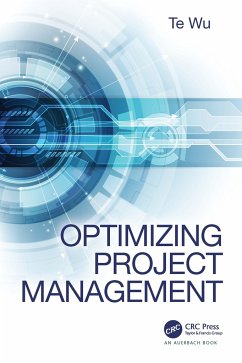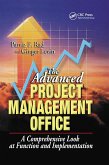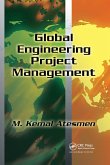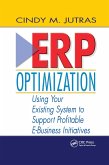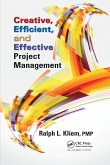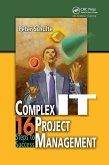Te Wu
Optimizing Project Management
Schade – dieser Artikel ist leider ausverkauft. Sobald wir wissen, ob und wann der Artikel wieder verfügbar ist, informieren wir Sie an dieser Stelle.
Te Wu
Optimizing Project Management
- Broschiertes Buch
- Merkliste
- Auf die Merkliste
- Bewerten Bewerten
- Teilen
- Produkt teilen
- Produkterinnerung
- Produkterinnerung
This book addresses major project shortcomings by adopting a consulting perspective. With an emphasis on tailoring and optimizing project management, the book offers a broad view that includes strategy implementation, portfolio management, program management, and PMO. The book closely aligns with the Project Management Institute's standards.
Andere Kunden interessierten sich auch für
![The Advanced Project Management Office The Advanced Project Management Office]() Parviz F RadThe Advanced Project Management Office80,99 €
Parviz F RadThe Advanced Project Management Office80,99 €![Global Engineering Project Management Global Engineering Project Management]() M Kemal AtesmenGlobal Engineering Project Management76,99 €
M Kemal AtesmenGlobal Engineering Project Management76,99 €![ERP Optimization ERP Optimization]() Cindy JutrasERP Optimization80,99 €
Cindy JutrasERP Optimization80,99 €![Creative, Efficient, and Effective Project Management Creative, Efficient, and Effective Project Management]() Ralph L KliemCreative, Efficient, and Effective Project Management76,99 €
Ralph L KliemCreative, Efficient, and Effective Project Management76,99 €![Complex IT Project Management Complex IT Project Management]() Peter SchulteComplex IT Project Management80,99 €
Peter SchulteComplex IT Project Management80,99 €![Project Management Recipes for Success Project Management Recipes for Success]() Guy L de FuriaProject Management Recipes for Success79,99 €
Guy L de FuriaProject Management Recipes for Success79,99 €![The Entrepreneurial Project Manager The Entrepreneurial Project Manager]() Chris CookThe Entrepreneurial Project Manager52,99 €
Chris CookThe Entrepreneurial Project Manager52,99 €-
-
-
This book addresses major project shortcomings by adopting a consulting perspective. With an emphasis on tailoring and optimizing project management, the book offers a broad view that includes strategy implementation, portfolio management, program management, and PMO. The book closely aligns with the Project Management Institute's standards.
Produktdetails
- Produktdetails
- Verlag: Taylor & Francis Ltd (Sales)
- Seitenzahl: 342
- Erscheinungstermin: 12. Mai 2020
- Englisch
- Abmessung: 235mm x 156mm x 20mm
- Gewicht: 522g
- ISBN-13: 9780367429928
- ISBN-10: 0367429926
- Artikelnr.: 59580431
- Herstellerkennzeichnung
- Libri GmbH
- Europaallee 1
- 36244 Bad Hersfeld
- gpsr@libri.de
- Verlag: Taylor & Francis Ltd (Sales)
- Seitenzahl: 342
- Erscheinungstermin: 12. Mai 2020
- Englisch
- Abmessung: 235mm x 156mm x 20mm
- Gewicht: 522g
- ISBN-13: 9780367429928
- ISBN-10: 0367429926
- Artikelnr.: 59580431
- Herstellerkennzeichnung
- Libri GmbH
- Europaallee 1
- 36244 Bad Hersfeld
- gpsr@libri.de
Dr. Te Wu is the CEO of PMO Advisory, a consulting and a PMI Global Registered Education Provider. It is also one of the few companies offering portfolio (PfMP), program (PgMP), project (PMP/CAPM), risk (PMI-RMP), agile (PMI-ACP), organization leadership & change management, and PMO training. He is also a professor at Montclair State University and China Europe International Business School. Prof. Wu has more than 25 years of professional experience specializing in strategy execution and establishing and leading large PMOs, and he is certified in Portfolio, Program, Project, and Risk Management. He is an active volunteer including serving on PMI's Portfolio Management and Risk Management Standard Core Teams. He is also a United States delegate on the International Standard Organization Technical Committee 258 for Project, Program and Portfolio Management. As a practitioner, executive, teacher, writer, and speaker, Dr. Wu enjoys sharing his knowledge and experiences and networking with other professionals.
List of Figures. List of Tables. List of Templates in Appendix A. Preface.
Acknowledgments. Author. Part 1 SETTING THE STAGE. 1 Project Management -
What and Why? 2 Organizing Project Management Knowledge - Principles,
Knowledge Domains, Life Cycles, and Agile versus Traditional Approaches.
Part 2 PROJECTS IN MOTION - FROM IDEAS TO RESULTS. 3 Ideation - Aligning
Projects with Strategy. 4 Initiation - Starting the Project Right. 5
Preparation - Planning to Achieve Optimal Implementation. 6 Implementing
Projects - Getting It Done. 7 Project Transition and/or Closure -
Celebrating Success. Part 3 KNOWLEDGE DOMAIN. 8 Project Integration
Management - The Most Important Knowledge Domain. 9 Stakeholder Management
- Knowing the People. 10 Scope Management - Defining Scope and Determining
Requirements. 11 Schedule Management - Understanding "When". 12 Resource
Management - Defining the Resources Required to Tackle Projects. 13 Cost
Management - How to Develop and Manage Budgets. 14 Communication Management
- Ensuring the Full Handshake. 15 Risk Management - Minimizing Surprises.
16 Quality Management - Designing It Right. 17 Project Supply Chain
Management - Extending beyond the Internal Resources. 18 Leveraging
Conflicts - How to Find the Optimal Balance of Conflicts. 19 Governance
Management - Establishing Decision Framework. Part 4 BEYOND PROJECT
MANAGEMENT. 20 Working with People - Building, Mobilizing, Managing, and
Leading Project Teams. 21 Program, Portfolio, Service Management, and
Strategic Business Execution. Appendix A: Selective Project Management
Templates. Appendix B: Case Study - Whole World Enterprise (WWE). Appendix
C: Glossary of Key Terms. Index.
Acknowledgments. Author. Part 1 SETTING THE STAGE. 1 Project Management -
What and Why? 2 Organizing Project Management Knowledge - Principles,
Knowledge Domains, Life Cycles, and Agile versus Traditional Approaches.
Part 2 PROJECTS IN MOTION - FROM IDEAS TO RESULTS. 3 Ideation - Aligning
Projects with Strategy. 4 Initiation - Starting the Project Right. 5
Preparation - Planning to Achieve Optimal Implementation. 6 Implementing
Projects - Getting It Done. 7 Project Transition and/or Closure -
Celebrating Success. Part 3 KNOWLEDGE DOMAIN. 8 Project Integration
Management - The Most Important Knowledge Domain. 9 Stakeholder Management
- Knowing the People. 10 Scope Management - Defining Scope and Determining
Requirements. 11 Schedule Management - Understanding "When". 12 Resource
Management - Defining the Resources Required to Tackle Projects. 13 Cost
Management - How to Develop and Manage Budgets. 14 Communication Management
- Ensuring the Full Handshake. 15 Risk Management - Minimizing Surprises.
16 Quality Management - Designing It Right. 17 Project Supply Chain
Management - Extending beyond the Internal Resources. 18 Leveraging
Conflicts - How to Find the Optimal Balance of Conflicts. 19 Governance
Management - Establishing Decision Framework. Part 4 BEYOND PROJECT
MANAGEMENT. 20 Working with People - Building, Mobilizing, Managing, and
Leading Project Teams. 21 Program, Portfolio, Service Management, and
Strategic Business Execution. Appendix A: Selective Project Management
Templates. Appendix B: Case Study - Whole World Enterprise (WWE). Appendix
C: Glossary of Key Terms. Index.
List of Figures. List of Tables. List of Templates in Appendix A. Preface.
Acknowledgments. Author. Part 1 SETTING THE STAGE. 1 Project Management -
What and Why? 2 Organizing Project Management Knowledge - Principles,
Knowledge Domains, Life Cycles, and Agile versus Traditional Approaches.
Part 2 PROJECTS IN MOTION - FROM IDEAS TO RESULTS. 3 Ideation - Aligning
Projects with Strategy. 4 Initiation - Starting the Project Right. 5
Preparation - Planning to Achieve Optimal Implementation. 6 Implementing
Projects - Getting It Done. 7 Project Transition and/or Closure -
Celebrating Success. Part 3 KNOWLEDGE DOMAIN. 8 Project Integration
Management - The Most Important Knowledge Domain. 9 Stakeholder Management
- Knowing the People. 10 Scope Management - Defining Scope and Determining
Requirements. 11 Schedule Management - Understanding "When". 12 Resource
Management - Defining the Resources Required to Tackle Projects. 13 Cost
Management - How to Develop and Manage Budgets. 14 Communication Management
- Ensuring the Full Handshake. 15 Risk Management - Minimizing Surprises.
16 Quality Management - Designing It Right. 17 Project Supply Chain
Management - Extending beyond the Internal Resources. 18 Leveraging
Conflicts - How to Find the Optimal Balance of Conflicts. 19 Governance
Management - Establishing Decision Framework. Part 4 BEYOND PROJECT
MANAGEMENT. 20 Working with People - Building, Mobilizing, Managing, and
Leading Project Teams. 21 Program, Portfolio, Service Management, and
Strategic Business Execution. Appendix A: Selective Project Management
Templates. Appendix B: Case Study - Whole World Enterprise (WWE). Appendix
C: Glossary of Key Terms. Index.
Acknowledgments. Author. Part 1 SETTING THE STAGE. 1 Project Management -
What and Why? 2 Organizing Project Management Knowledge - Principles,
Knowledge Domains, Life Cycles, and Agile versus Traditional Approaches.
Part 2 PROJECTS IN MOTION - FROM IDEAS TO RESULTS. 3 Ideation - Aligning
Projects with Strategy. 4 Initiation - Starting the Project Right. 5
Preparation - Planning to Achieve Optimal Implementation. 6 Implementing
Projects - Getting It Done. 7 Project Transition and/or Closure -
Celebrating Success. Part 3 KNOWLEDGE DOMAIN. 8 Project Integration
Management - The Most Important Knowledge Domain. 9 Stakeholder Management
- Knowing the People. 10 Scope Management - Defining Scope and Determining
Requirements. 11 Schedule Management - Understanding "When". 12 Resource
Management - Defining the Resources Required to Tackle Projects. 13 Cost
Management - How to Develop and Manage Budgets. 14 Communication Management
- Ensuring the Full Handshake. 15 Risk Management - Minimizing Surprises.
16 Quality Management - Designing It Right. 17 Project Supply Chain
Management - Extending beyond the Internal Resources. 18 Leveraging
Conflicts - How to Find the Optimal Balance of Conflicts. 19 Governance
Management - Establishing Decision Framework. Part 4 BEYOND PROJECT
MANAGEMENT. 20 Working with People - Building, Mobilizing, Managing, and
Leading Project Teams. 21 Program, Portfolio, Service Management, and
Strategic Business Execution. Appendix A: Selective Project Management
Templates. Appendix B: Case Study - Whole World Enterprise (WWE). Appendix
C: Glossary of Key Terms. Index.

